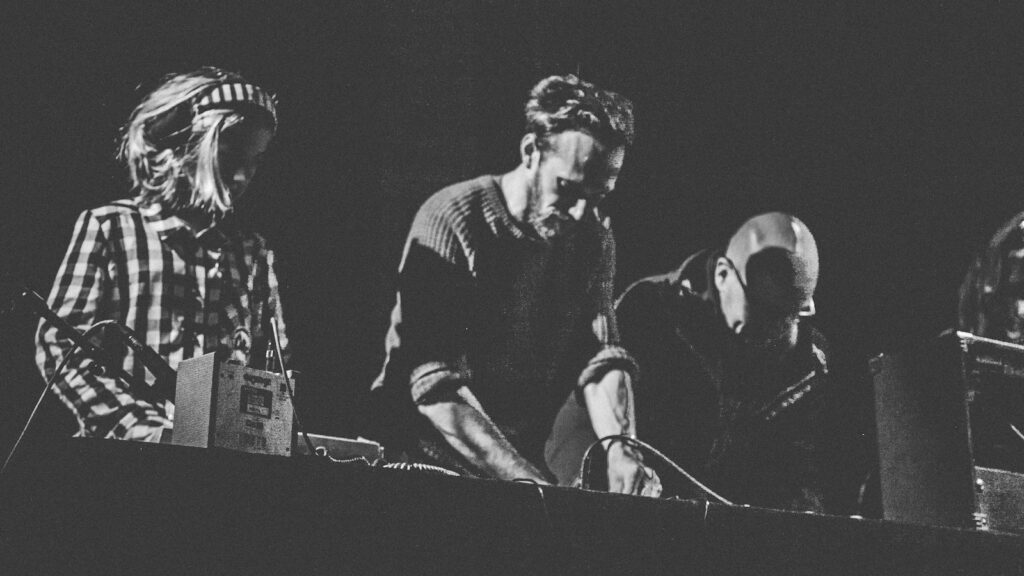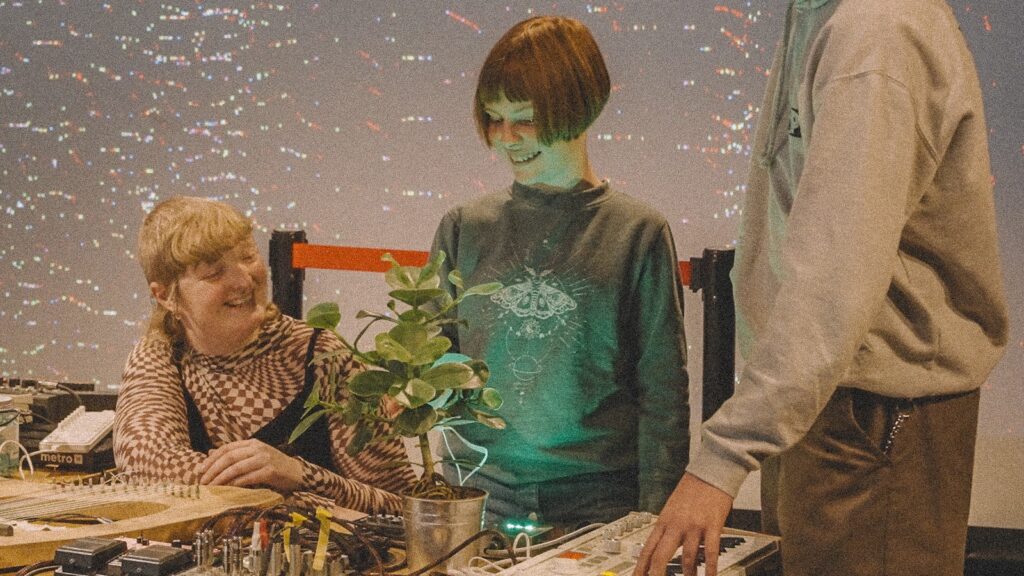
Rhys Edwards (OND/Gwenno) writes about his video-format graphic score ‘Emmet’s Pit’
Rhys Edwards is a musician and producer. He produced and helped compose Gwenno’s critically acclaimed Le Kov album, to whom he is married. He has created a video for anyone to make music to as part of our #ScoresOfPeople project. It is a graphic score, which is a form of composing music that is an alternative to traditional stave notation (meaning you don’t have to be able to read music to perform this score, just make sounds in a way that you think the video is showing). Note that the video is silent to allow you to make your own music to it (although Rhys is currently recording music to it). For more info on the project, and to get involved, visit our Scores Of People pages here. Here, Rhys writes about the idea behind the composition:
I was kindly invited to contribute to a project called ‘Scores of People’, an idea developed by Matt Ashdown (of Mildred Maude) as part of his Cornish arts organisation, Moogie Wonderland. The concept, to create a graphic score, share it with others and respond to it with new music. Here is a summary of my thought-process as I developed an idea for the project.
[* ‘Emmet’ (alt. spellings ‘emmit’ or ‘emit’): a pejorative nickname that some Cornish people use when referring to tourists who visit Kernow.]
I began thinking about ‘Scores of People’ + Cornwall when we were amid the initial wave of the pandemic. Cornwall was a regular feature on the news – tourists and holiday homeowners were ignoring Cornwall Council’s polite request to stay away; locals were too scared to go out food shopping. “I came down here to escape from all this virus nonsense”, tweeted one ’emmet’. When Mark Twain said, “travel is fatal to prejudice, bigotry, and narrow-mindedness”, he obviously hadn’t been to St. Ives (Porth Ia) in mid-August.
I am well aware that I’m also an ‘emmet’, although I’m hoping no one will notice. I am at the very least an outsider, looking in. I was brought up on a patch of land which eerily resembles Kernow in so many ways (Ynys Môn) and over the last few years, I’ve been lucky enough to make records with my fellow voyager, Gwenno, quietly throwing away the linguistic rule books by travelling the world performing in Kernewek. I should also add that I’m currently the only member of my household who doesn’t speak Cornish.
One of the striking parallels with Ynys Môn is its awkward relationship between tourists and those who serve it (the locals). It has always been a sore issue, but never has it been legitimised as a reasonable talking point as it has right now, mainly because of the current pandemic but possibly also because of the Brexit backdrop. Newspapers will often express a view about Cornish locals’, and without any sense of irony, encouraging readers to escape the pandemic by visiting Cornwall. Of course, the harsh reality cannot be further away from the idyllic postcards, the oil paintings and the riviera vision of Cornwall. Unfortunately, for all the wonderful restaurants, holiday homes and art retreats, second only to west Wales, Cornwall is the poorest region in the whole of northern Europe.

However depressing tourism can be and how the holiday letting industry has been allowed to systematically neglect Cornwall’s economy and its people, I didn’t want to compose a musical rant about tourists. We are all ’emmets’, after all. We’re all going on holidays to escape something or other. But what are we all escaping from? What are we savouring? What are we learning about people and places, and more importantly, ourselves? It feels as if we are a generation of zombie travellers obsessed with social media, online sharing, creating stories and storing memories on our iPhones instead of our minds. Achieving presentness seems unimportant. It feels as if the ‘moment’ has been reduced to uploading instant happiness, filling our iClouds with content and, with it, diminishing actual life experiences.
A possible line of resistance against the undercurrent of pervasive cultural imperialism and our innate inability at being more present during our travels is the importance of openness, of valuing and understanding all our stories. Instead of acting on impulse, we need to know our own history, and if we lose it, we need to get it back. As Clive James said, “…we could, if we wished, do without remembering or thinking, and gain all the advantages of travelling light; but a deep instinct, not very different from love, reminds us that the efficiency would be bought at the cost of emptiness.”
As I was developing an idea for this graphic score, I was thinking a lot about the strange pandemic we’re living through at the moment – how it has brought a lot of underlying issues to the surface whilst also strengthening a sense of togetherness (even though we’re apart). We’ve given more weight as a society to decisions made locally, and people across the UK are beginning to realise the benefits of decentralisation, giving everyone as much voice as possible, not for the sake of separatism (as is often peddled), but to have a better understanding about the needs of each corner of these islands. It feels as if deep rooted lines and boundaries on old maps are resurfacing again in a post-imperial Britain, like old scars in the land; like wires on telegraph poles, like chemtrails in the sky. Like staves on a score…
One of the places I always love visiting when I’m down in Cornwall is Gwennap Pit. It’s an incredible place, a natural amphitheatre caused by mining subsidence that bore witness to fervent Methodism in the 18th century – a radical, anti-establishment movement that indirectly tapped into the Cornish psyche by loosening the shackles of Anglicanism and inadvertently energised identity politics, highlighted social injustices and left an indelible mark on Kernow.
I first came across this unique place on John Peel’s ‘Sound of the Suburb’ series. He was interviewing the John Wesleys of Intelligent Dance Music, Richard D. James (Aphex Twin) and Luke Vibert, in the bowels of Gwennap’s pit. Wesley was a regular here during the first wave of Methodism, radicalising his non-conformist followers with his anti-establishment preaching and powerful, communal music. I’d like to imagine that one of Wesley’s big sermons, ‘A Public Diversion’, (which was actually about the dangers of alcohol) could also have been about the dangers of building rubbish roads, and more to the point, the annoyance of being stuck with other tourists on an 80+ mile gridlock on the A30. Given the extraordinary number of journeys he took to Cornwall, many of which were harrowing, I imagine John Wesley might have had very strong opinions about that road and its lack of adequate service stations along the way.
John Peel interviews Richard D. James (Aphex Twin) and Like Vibert at Gwennap Pit
A few years ago, when I was part of a collective behind the Peski label and an experimental music platform called CAM, we invited the music writer and composer Sam Richards (of Plymouth University) to perform one of his experimental works, ‘Fish Music’ at the Wales Millennium Centre. It involved fish swimming in a tank that became musical notation by means of a five-line musical stave being placed across the glass. String players were instructed to choose a fish and follow its course behind the stave. It was an unforgettable performance and such a pleasure to see Sam Richards perform this ambient piece with his other improvisors, which included one of my heroes, the prolific producer Gorwel Owen.
And so, my contribution responds to Sam Richards’ work. But instead of using fish, I’ve used Gwennap Pit as my (geological) graphic score, allowing me to explore the absolute (’emmet’’s) pits of tourism hell in Cornwall and attempt to question, in our never ending quest to escape from something or other, whether we are ‘there’ at all beyond the movement of our physical beings? Are we just notes on a stave, just ‘lonely specks in the great enveloping cosmic dark’, forever wandering in our past and futures, forever crossing lines?
Scores Of People is a Moogie Wonderland project that has been made possible thanks to Arts Council England with funding from the National Lottery.


